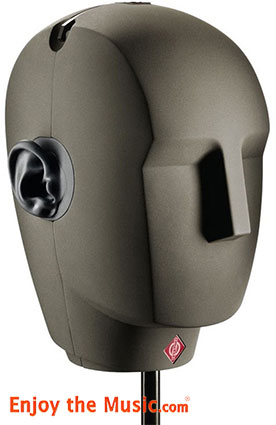|
|
Home | High-End Audio Reviews | Audiophile Shows | Partner Mags | Hi-Fi / Music News |
|
|
|
30 Years Of Service To Music Lovers |
|
|
|
|
|
June 2021
Enjoying The Music: Do We All
Hear The Same Thing?
Roger Skoff writes about how we listen and what it means.
Article
By Roger Skoff
Many years ago, back in the late 1980s or early 1990s, a magazine did a demographic study of its readership and found that well over 90% including subscribers, newsstand buyers, and pass-along readers were male. Shortly after that came out, I and a bunch of other high-end audio reviewers (I was reviewing for the publication Sounds Like at the time) happened to get together at the Summer CES in Chicago (yes, they still had two Consumer Electronic Shows a year, back then) and we got to talking about why that might be after all, everybody likes music, both men and women, so why would it be almost exclusively guys that were interested in high fidelity sound?

As it was, two guys in the group from different publications were licensed PhD psychologists, so we had their professional opinions to combine with the casual observations of the rest of us in concluding that, even though experiencing the same music, men and women didn't necessarily hear the same thing.

It was all a matter of what they listened for.
Have you ever noticed that women usually seem to know the words to whatever song is playing and that men usually don't? The reason is simple: Women tend to be interested in the meaning of the song the story it tells or the emotions it expresses, while men listen to the same song more for its sound or its rhythm, and regard the words if they listen to them at all as just one part of the musical whole. That, right there, if true, may explain why there are so few women audiophiles: If what they're primarily listening for is just the words, what they're playing the music on probably doesn't matter very much whatever it is, the words are always (clinically) the same.

That same kind of thing would go a long way toward explaining other things, as well.
One of those things might be why audiophiles are so strongly divided on so many issues. Among which are the seemingly perpetual controversies over which better, analog is or digital sound? There are also debates concerning tube or solid-state amplification. When it comes to loudspeaker enthusiasts, we have horn, cone, or planar speakers or whether cables, cable lifters, cryogenic freezing, high-voltage blasting, audiophile cleaning products, or any number of other accessories, "tweaks", or treatments make an audible difference to the sound of a system.

The fact of it is that different people do hear the same thing differently, and there's even a whole branch of science, psychoacoustics, devoted to how that works and why. According to psychoacousticians, "hearing is a cognitive phenomenon that... varies from [one] person to another and even within the life of an individual. It is therefore essential to take into account the human dimension when analyzing a sound to accurately describe the way it is perceived."

What that means is that what we hear when we listen to something will vary depending on the actual sound experienced, our physical ability to hear it, and our own personal predilections toward perception. In short, to at least some degree, of the sound that our ears pick up, we hear what we want to hear or what interests us and the rest may be disregarded or even filtered out.
A perfect example of that is the story, often heard in various forms, of the mother who hears and responds to the cries of her child even despite what ought to be overwhelming levels of background noise.

People do hear what's important to them, and audiophiles and music lovers are no exception. Whether it's because our tastes and preferences affect what we hear or because what we hear affects our tastes and preferences, what we hear when we listen to music is largely and assuming that it's there in the music or the recording to begin with what we listen for.


And what we listen for can be practically anything. Personally, I'm a big fan of imaging and soundstaging. Others are big on mid-range clarity, or music's "harmonic envelope", or transient attack and decay, or dynamics, "blackness between notes", bass or treble extension, pace, rhythm, or any of a host of other sonic or musical characteristics. Whatever it is, that's what we will notice first and what, along with whatever other things are important to us, in hierarchical order, we will judge the performance of our system by.

It also works the other way around: If there's something we don't like some flaw in our system, for example, that we may not even notice at first once we do notice it, it can persist and, even though barely perceptible to others, continue to grow more and more annoying until it dominates our listening and we're finally forced to do something about it.

This fact of hearing what's most important to us about the music we listen to or about the sound of our home audio system is one of the reasons why subjective reviews can really be much more important to audiophiles than even that most highly regarded of objective testing procedures, double-blind testing. That fails as an audiophile tool for precisely the reason we've been talking about: in order to provide meaningful results, double-blind testing requires the isolation of just one single factor for comparison and, as I've said, everybody listens for something or some combination of things different from everybody else.
Far better to just find a subjective reviewer whose tastes are similar to your own and let his reviews be your guide in developing your system. Or better yet, use your own ears and your own tastes and preferences in making your selection. After all, only you will ever hear things exactly the way you hear them.

Then, when everything is just the way you want it, turn your system on, put on some tunes, sit back, close your eyes, and...
Enjoy the music!
Roger Skoff
Note: Roger Skoff is an audio authority with many years of experience. He has more than 500 published articles within various major audiophile publications. He was also the founder and designer for XLO Electric Company, Inc. a manufacturer of premium cables for high-end audio and home theater. Roger currently heads a new company named RSX Technologies, Inc., which designs and manufactures cables and other premium products for high-end audio and custom installation.

 High-Performance Audio Reviews
High-Performance Audio Reviews











